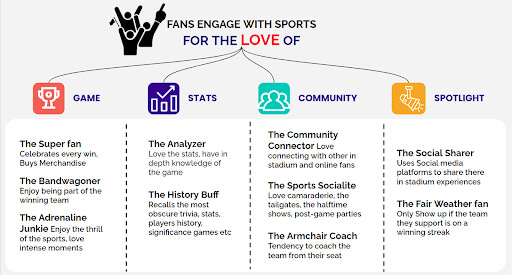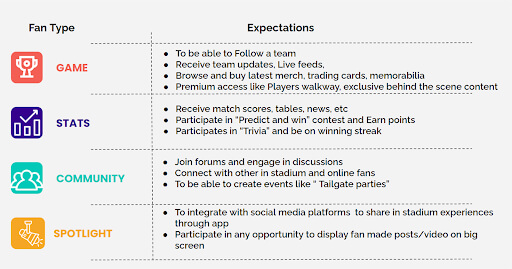Engaging With Sports Fans In The Digital Age.

Introduction
As the world continues to grapple with the irreversible repercussions of COVID-19, a silver lining emerges in the form of global innovation, transforming various business sectors.
The sports industry stands at the forefront of these changes, ushering in a new era marked by smart stadiums and superior live-streaming platforms, all aimed at ensuring fan engagement transcends the boundaries of a single game. By 2027, the global sports technology market is set to burgeon to a staggering USD 36.66 billion, reflecting a robust compound annual growth rate (CAGR) of 17.8%.
In this blog, we are looking at how the connection between fans and their favorite sports games is changing and how technology is becoming a key part of this change, making the fan experience even better.
What do we mean by Fan Engagement?
Across the globe, various sports organizations are keenly exploring and fully cognizant of the invaluable advantages linked with robust fan engagement. This strategic focus results in cultivating a “loyal fan base,” effectively “attracting new fans,” and building an “enhanced sense of belongingness within the sports community.”
Understanding a Sports Fan
Type of Fans and their motivation to be associated with the sport:

Motivations of Different Fan Types Shape their Preferred Features:

Engaging the Sports Fans During and Beyond the Season
To keep the ball rolling…. !!! Exploring some compelling use cases where technology is truly revolutionizing fan engagement.
During the Season
Sports fans crave being close to the action. Being surrounded on all sides by fans is an experience everyone has to experience at least once.
- A Ticket Tracking System
Various e-ticket analyzing vending machines have enhanced ticket holders’ experience by making it a “No contact stadium experience.” It’s an automatic platform that alerts sports clubs and the stadium management of attendance.
To name a few examples, like
- Facial recognition software to verify the identity of customers in stadiums.
- Barcode scanners installed at the entry point can allow you to enter with a simple wave of your smartphone.
- Scanning a URL QR code to land on the official website and instantly access event details allows users to buy that event ticket and makes the entire stadium entrance process as seamless as possible.
- Creating Digital and Commemorative Tickets
The necessity for physical tickets is fast becoming a thing of the past. A shining example of this technological shift in the sports industry is the emergence of commemorative tickets. These are exclusive tickets, produced in limited quantities and available only for a specified duration, celebrating unique events or anniversaries. These commemorative tokens are not just digital analogs to physical tickets; they are potential contenders for Non-Fungible Token (NFT) collectibles. Thus, they blend traditional keepsakes’ nostalgic charm with digital assets’ convenience and novelty.
- Location-based Messaging
This innovative approach guides the attendees from stepping foot in the stadium to various designated areas throughout the event. For example, navigating an attendee from entry to their allotted seat or nearest pick-up point for pre-ordered food and beverages. Coupled with the application of beacon technology, it can pinpoint the attendees’ locations and deliver personalized messages loaded with key information. This method provides an added interaction layer, enhancing the overall event experience.
- Elevating the Experience through Immersive Technologies
Immersive technologies are steadily revolutionizing how sports fans experience the captivating thrills, adrenaline surges, and crucial game analytics unique to every match. They bring to life every moment, from the player’s individual statistics to the critical final minutes of the game. Virtual Reality (VR) offers fans a groundbreaking, real-time experience, allowing them to view the game through the lens of a specific player. Meanwhile, Augmented Reality (AR) offers in-stadium attendees the ability to access the game stats of a player at their fingertips. These continuously evolving technologies promise an exciting, hyper-realistic future for sports fans worldwide.
- The Revolutionary Impact of Drone Technology in the Sports World
Drones are forging fresh pathways in the evolving sports landscape, bringing to the table a blend of aerial surveillance, mobility, data gathering, artificial intelligence, lifting capabilities, and visual technologies. This multifaceted combination renders drones an ideal fit for a multitude of applications in sports, from conventional uses to disruptive innovations. A few examples could be security surveillance of stadium attendees, getting pre-ordered food and beverages delivered to seats and more.
- Harnessing AI for a Data-driven Approach
AI is poised to significantly shape a fan’s journey within and beyond the stadium. Stadiums are evolving into significant content and data hubs, meticulously designed to optimize the customer journey and meet the dynamic needs of fans. Stadiums and fan platforms are transforming into ‘data sanctuaries.’ Armed with these data points, personalized marketing campaigns, interactive games, and sales recommendations can be devised. This strategy enhances the fan experience, making it more immersive and personalized.
- A Unified Experience Through a Single App
One of the most transformative developments is the advent of a comprehensive app that serves as a one-stop hub for all fan interactions. This platform fosters a vibrant community, streamlining various fan activities such as booking tickets, staying abreast of the latest news and updates, and participating in voting polls. In addition, fans can engage in quizzes and trivia, stimulating friendly competition and adding an additional layer of interaction to their sports experience. This consolidated approach enhances fan engagement and simplifies their journey, creating a more seamless and enjoyable experience.

Beyond the Season
Fan engagement need not wane during the off-season. This period can be effectively utilized to keep fans connected and excited for the upcoming season. One way to achieve this is by rolling out innovative initiatives and platforms to continue the interaction and conversation.
- E-Commerce: Merchandise Sales and Auctions
Capitalizing on e-commerce platforms to sell merchandise can significantly boost off-season engagement. Live auctions and reverse auctions present a unique opportunity for fans to own memorabilia of their favorite team or player. This maintains fan interest during the off-season and opens up new revenue streams for sports organizations.
- Non-Fungible Tokens (NFTs) collectibles and Digital Assets
Leveraging NFTs to sell digital assets and collectibles has emerged as an innovative way to keep fans engaged. These unique digital assets can range from event custom posters and trophies to tickets, each being valuable to the sport’s legacy. By creating a buzz before the season starts, NFTs offer an exciting build-up to the main events and maintain fan engagement.
- Engaging Fans through Fantasy Games
The format of fantasy games has revolutionized fan engagement during the off-season. By allowing fans to create their own teams and make strategic decisions, these games keep the spirit of competition alive even when there are no live games. This form of interactive engagement keeps fans involved and invested in the sport, effectively bridging the gap between seasons.
Conclusion
The sports industry has undergone a transformative shift driven by the strategic implementation of fan engagement strategies. These approaches have fueled exceptional growth, delivering substantial value to sponsors, stimulating positive conversations around sports, and creating unprecedented opportunities for revenue generation. Technology has been at the heart of this evolution, profoundly expanding and enhancing how fans interact with their favorite sports. As we reflect on the past, it becomes abundantly clear that this trend of technological influence is only set to escalate in the future, further revolutionizing fan engagement in the sports industry.
![Blog-[x]cube LABS](https://d6fiz9tmzg8gn.cloudfront.net/wp-content/uploads/2016/06/blog_banner.jpg)






